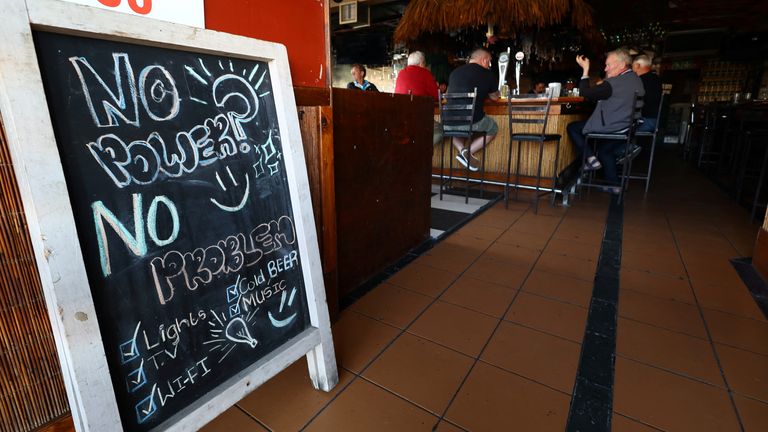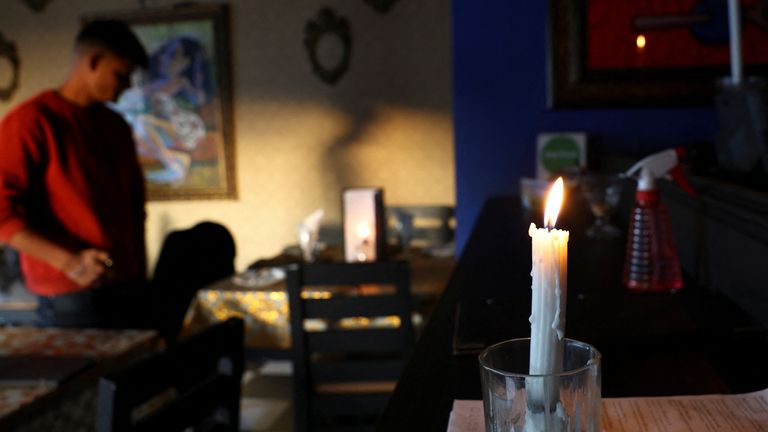How cyanide poisoning of Eskom boss Andre de Ruyter shines light on corruption in South Africa
For the chief executives of most leading British companies, occupational hazards include the media publishing details of their salary, the occasional protest at the annual meeting and, if they are really unlucky, the unions turning up on their front drive to stage a demonstration.
It’s certainly nothing along the lines of what has just been endured by Andre de Ruyter, the outgoing chief executive of Eskom, South Africa‘s state-owned electricity generator.
Mr de Ruyter, who is due to step down in March, confirmed at the weekend that last month he survived an attempt to poison him using cyanide.
The specialist energy information publication EE Business Intelligence had earlier reported that, on 13 December, Mr de Ruyter had drunk a cup of coffee laced with cyanide. The day before, he had submitted his resignation letter to Mpho Makwana, the Eskom chairman.
EE Business Intelligence said Mr de Ruyter had been drinking the coffee in his office at the company’s head office, Eskom Megawatt Park, in Sunninghill, north of Johannesburg. It said he became “weak, dizzy and confused, shaking uncontrollably and vomiting copiously” before he collapsed and was taken to a doctor.
It said he had been treated for poisoning after it was discovered there were “massively elevated levels of cyanide in his body”.
Mr de Ruyter, 51, told the newspaper Business Day: “The opening of the case was delayed by a long wait for the results of the second test, which I assume was due to the festive season. After my doctor sent me the results and interpreted the results for me, I consulted with advisers as to my next steps.”
He said he did not immediately report the incident to the police but did so once it became clear that it was going to find its way into the public domain.
He added: “I didn’t particularly want the sensation that has now resulted.”
‘Organised crime infiltrated company’
The incident has horrified South Africa and highlighted the endemic corruption that has paralysed much of the country’s economy.
Mr de Ruyter, who became chief executive of Eskom in December 2019, has made clear on numerous occasions that he believes organised crime has infiltrated and been stealing from the company.
He has suggested that crime syndicates have been looting both coal and spare parts from the company’s power plants, as well as deliberately sabotaging power stations to win maintenance and repair work.
He told the Financial Times in October last year: “Make no mistake Mpumalanga [the coal-producing region that is home to many of Eskom’s power stations] is a gangster province. We’ve had contractors shot in their cars on the way to site because they didn’t give jobs to the right people.”
Enemies in high places
Mr de Ruyter’s attempts to take on those he believes responsible for the corruption have also made him enemies in high places.
Eskom’s lack of resources has led to an increasing number of power cuts – there were blackouts on more than 200 days last year – including on New Year’s Eve. Mr de Ruyter sought to tackle the problems, in part, by making South Africa’s energy mix more dependable on renewables.
This led to clashes with Gwede Mantashe, the energy minister, who has publicly accused Eskom of “actively agitating for the overthrow of the state” and particularly when Mr de Ruyter called for a lifting of the cap that limits the proportion of electricity generated from renewables.
Mr de Ruyter told the FT last month: “I got in trouble with Minister Mantashe for advocating a lifting of the cap. He told me to stay in my lane.
“I said: ‘Why would you not want as many megawatts as possible when you’re load shedding?’. One of the reasons why we’ve got load shedding is very much to drive – perversely in my mind – the preservation of coal.”
‘Difficult to steal sun and wind’
Such comments mean that Mr de Ruyter, who has argued publicly that just because South Africa is rich in coal reserves it should not be burning it, has taken on vested interests.
He told the FT in the same interview: “One of the reasons why there is this animosity towards renewables is that I think it’s very difficult to steal sun and wind.”
Mr de Ruyter, who is at all times accompanied by a bodyguard, has also been frustrated by a lack of support from ministers in his attempts to address the pollution created by Eskom.
The company emits more sulphur dioxide than China and the United States combined, while its carbon emissions represent two-fifths of the total for South Africa.
By contrast Mr Mantashe, a former coal miner and prominent activist in the country’s National Union of Mineworkers, has previously described himself as a “coal fundamentalist”. His accusation of treason against Eskom, it is said, left Mr de Ruyter with no choice but to offer his resignation.
Trigger point to take corruption seriously
The poisoning incident may finally trigger sufficient alarm in the government to take seriously the corruption endemic in many state-controlled entities.
Pravin Gordhan, the minister of public enterprises, told Business Day the attempt on Mr de Ruyter’s life showed there was an “intense battle taking place” between “those who want South Africa to work and thrive and those who want to corruptly enrich themselves”.
Problems go to heart of economy
The problems at Eskom go to the very heart of South Africa’s economy.
The rolling blackouts have severely hurt industry and are expected to continue to do so this year.
The broker and corporate finance specialist SP Angel expects blackouts to clip 0.4% from the country’s GDP this year. It has led an increasing number of businesses operating in the country, including some of the miners, to construct their own power generating facilities at their plants to reduce dependence on Eskom.
And the stakes are also increasing for the government itself.
The ruling African National Congress faces a general election next year.
Its poll ratings have been falling due partly to the poor state of public services and, in local elections in 2021, it won less than half the vote – the first time that has happened since it assumed power under Nelson Mandela in 1994.
So Eskom’s ability to keep the lights on may prove critical in more ways than one.
For all the latest business News Click Here



